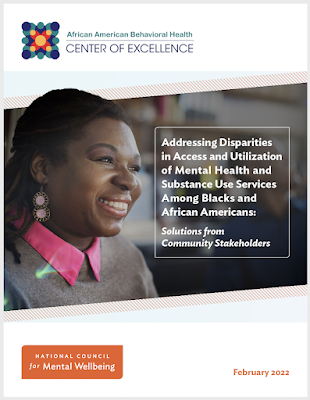Black people in the United States have rates of mental health conditions and substance use comparable to the general population. Yet outcomes for Black/African American people are poorer overall compared to the general population.
A recent study found that older Black men were dying of opioid overdose at a rate four times greater than the overall opioid overdose fatality rate.
In partnership with the African American Behavioral Health Center of Excellence, the National Council for Mental Wellbeing has developed a white paper to assist with understanding the health disparities that exist in the access, engagement, utilization and outcomes for B/AAs seeking specialty mental health and substance use treatment services.
Located within the Morehouse School of Medicine’s National Center for Primary Care, the AABHCOE will use innovative, evidence-based, culturally aligned systems-change, workforce development, technology transfer and collaborative national partnerships to eliminate disparities and promote mental health and substance use treatment and health equity for African Americans.
The white paper focuses on five key findings that emerged from focus groups, as well as potential solutions.
Challenges facing Black/African Americans in Mental Health/Substance Use Treatment:
1. Lack of Resources/Social Determinants of Health
2. System/Financial Barriers
3. Lack of Focus on Prevention and Education
4. Lack of staffing
5. Trauma
Lack of resources
“The B/AA community is disproportionately impacted by issues such as poverty, incarceration, transportation, underserved schools, environmental exposures, insurance coverage, adequate housing and other social determinants of health,” the white paper states.
The lack of resources makes accessing and maintaining mental health and substance use services more difficult and lead to poorer outcomes. The effects can be even worse in rural areas.
The white paper suggests prioritizing building grant-writing infrastructure, as well as increasing use and capacity for telehealth services. It also proposes working with and embedding mental health and substance use providers in existing community organizations, like faith-based institutions.
System/Financial Barriers
“Structural barriers exist both in the financing of mental health and substance use services and the location of services which can have significant effects on access to care,” the white paper states.
Solutions should include greater incentives for the provision of care in under-resourced communities, and expansion of substance use and mental health services in non-traditional settings.
Lack of focus on Prevention/Education
“The importance of prevention and early intervention before the exacerbation of symptoms was emphasized by all participants,” the white paper stated. “This lack of prevention and early intervention services can lead to B/AAs accessing care in in the most expensive and trauma inducing ways such as emergency rooms, hospitals and criminal justice settings.”
Solutions include prioritizing prevention and education efforts, as well as screening for mental and substance use challenges in non-traditional settings. Find out more information about the latest in prevention research and education at The Prevention Technology Transfer Center’s website.
Lack of staffing
“The failure of service providers to bridge this cultural divide can contribute to discontinuation of treatment among B/AAs,” the white paper stated. “Engagement of patients during treatment can be a difficult task and the lack of well- trained professionals skilled in working with diverse populations certainly contributes to this problem.”
Solutions include increasing investments in recruiting and retaining B/AA providers in the mental health and substance use field, greater use of peer support specialists, and better supervision around cultural competencies.
Trauma
“Historical trauma and current-day injustice can affect perceived psychological safety in treatment and impact long-term recovery,” the white paper stated. “Addressing historical trauma was a solution mentioned during the interviews as many cited examples of racial trauma having detrimental psychological effects on people and their communities.”
Solutions include providing additional training on trauma-informed approaches to care, and utilizing family-centered treatment models.
You can read the full white paper here. Additional resources and TTA may be obtained from the following organizations:
- African American Behavioral Health Center for Excellence
- The Addiction Technology Transfer Center
- The Prevention Technology Transfer Center
- The Peer Recovery Center for Excellence


No comments:
Post a Comment